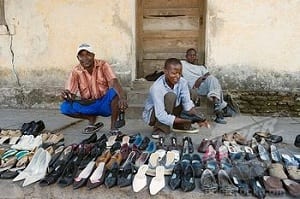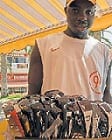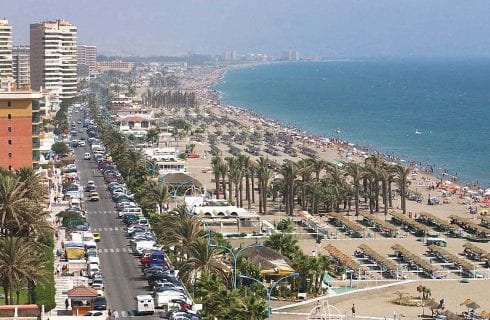By Eloise Horsfield and Helen Pierpoint
THEY roam Andalucia’s beaches in the searing midday heat, offering trinkets, clothes and counterfeit gear to sunbathers – often making as little as €10 a day.
Heralding from north Africa and sub-Saharan countries, the tens of thousands of ‘looky looky’ men, as they are pejoratively known, lead precarious lifestyles, living on the very edge of society.
Sending the vast majority of their earnings to wives and children in Africa, they are usually left with little to spare and are forced to live in overcrowded squats or small flats, usually two or three to a room.
Yet, despite being treated with absolute disdain by many holidaymakers – and sometimes even physically attacked – they are rarely less than good humoured, sporting smiles and gentle demeanours throughout their long hot days.
Indeed, it comes as a big surprise to many beach bar owners and tourists alike, that this month two Senegalese men are about to go on trial for allegedly attacking three police officers in Granada last year.
The pair are facing a one-and a-half year prison sentences and a €500 fine and deportation for allegedly putting the officers in hospital and even damaging their van.
 The men had been standing guard to protect ‘manteros’ who are so-called because they display their merchandise on mantas (blankets) which they can gather up swiftly in order to make a hasty exit if the heavies approach.
The men had been standing guard to protect ‘manteros’ who are so-called because they display their merchandise on mantas (blankets) which they can gather up swiftly in order to make a hasty exit if the heavies approach.
But, this sort of incident is extremely rare, and most of the time the hawkers are good natured and accept it when their goods are seized.
Of course, we must remember, these men are flogging their goods – often picked up from wholesale stores – without licences, often without the right to even be in Spain.
Many of these goods are now counterfeited and, as of this year, it has become more serious to download and sell fake merchandise and pirated CDs.
Under Spanish law, street sellers are required to obtain a licence from their town hall before offering merchandise to the public.
“But each town hall has its own exact rules and it’s at a local level the issue needs to be controlled,” says a spokesman from Spain’s National Consumer Institute.
“It has nothing to do with us,” confirms a central government spokesman.
Local crackdowns however have had various degrees of success.
Anecdotal advice suggests police attempts to deal with hawkers are half-hearted
Over in Murcia, Cartagena Town Hall has recently seized over a thousand articles through out May and June – including pirated DVDs, fake designer clothes, perfumes, watches and sunglasses. https://www.globosurfer.com/best-polarized-sunglasses/
Meanwhile, if local police – who work with the town halls – find an unlicenced vendor is also living in Spain illegally, their file will be passed to the Guardia Civil.
“It is them who deal with illegal immigrants and deportation,” says a Nerja Town Hall spokesman.
A Benalmadena policeman said: “Regarding expulsion, some immigrants use the law when they want to go back to their countries.
They actually ask to be deported so they get their plane ticket paid for, even though the law should only be used against illegal immigrants who are minors.”
Anecdotal evidence, however, suggests police attempts to deal with hawkers are somewhat half hearted, with one English teacher describing the ‘Laurel and Hardy’ sequence she saw near Playa Venus in Marbella.
“I watched a policeman on a scooter skid to a halt by a group of them,” says Sally Adams, 31, who lives in the Genal Valley. “They all scattered and ran, some dropping their stuff on the way. The scooter gave chase and finally cornered one guy.
 “The policeman could have quite easily arrested him – he had him by the arm but was still on his scooter – but he hesitated too long and the guy got away again.
“The policeman could have quite easily arrested him – he had him by the arm but was still on his scooter – but he hesitated too long and the guy got away again.
“Clearly he was not that bothered about catching him.”
Other witnesses report seeing police officers chasing the sellers as far as the beach, then giving up once their targets disappeared onto the unforgiving, hot sand.
This is confirmed by talking to some of the men themselves.
“I never have any trouble from the town hall,” grins 28-yearold Khalifa, a Moroccan who lives in Malaga and spends his days traipsing along Playa de la Rada in Estepona selling dresses.
“I buy the clothes here in Spain where cheap, and sell them here and in northern Morocco,” he explains.
“I go backwards and forwards between the two countries, spending about two weeks in each.”
Nerja Town Hall recently however announced a clampdown on hawkers apparently fuelled by disgruntled shop owners.
“We were receiving complaints from local business. I don’t know how many though,” a town hall spokesman explains.
While there have been no arrests so far, 500 articles have been seized in a matter of weeks – mostly fake Ray-Ban sunglasses, but also counterfeit Ralph Lauren polo shirts and even massage equipment.
But while some businesses are obviously put out by the presence of hawkers – with one chiringito owner in Estepona complaining ‘I pay loads of taxes and they don’t’ – the Olive Press found most bar owners to be tolerant.
“We haven’t got a problem with them,” said Georgia Kirby who says eight hawkers per day come into her parents’ bar, Olas, on Playa
Burriana in Nerja – a tourist hub where much of Nerja Town Halls’ efforts are being targeted.
“If you ask them to go, they go.
“The only ones that annoy us are the ones playing music. We are a sports bar and they end to come in just as the football is about to start,” she added.
‘They have to jump in bushes and throw their merchandise in bins’
Diane Salters, owner of Blue Med, also on Playa Burriana, is also tolerant.
“I’m fine with them,” she said. “They are really nice people and I’m happy for them to come in.
“I’m surprised about the crackdown by Nerja Town Hall – I’ve been on holiday in places where it is far worse.”
One San Pedro woman, who does not wish to be named, feels so protective of the hawkers that she even hides them in the attic of her seafront restaurant.
“I hide them from the police and give them drinks. They’re not doing any harm,” she says.
“Local police are putting such a clamp on them. It’s like a fox hunt and I feel sorry for them. They have to jump in bushes and throw their merchandise in bins,” she says.
“And, on top of that, the Brits love them.”
Again, in the hawkers’ defence, Dutch journalist Caroline van Soelen – who is currently making a TV documentary on them – says many actually held down proper jobs in their previous country before heading to Spain.
 “They are actually operating illegally through lack of choice,” she explains.
“They are actually operating illegally through lack of choice,” she explains.
“They come here for a better life, but it ends up being a worse one.”
Benalmadena-based Van Soelen interviewed dozens of ‘looky looky’ men after being shocked about notices she found on various websites warning British tourists against hawkers.
“Many of them simply want to be legal,” she said.
“One guy said he used to be a taxi driver in Ghana and wanted to do the same work here. The Spanish authorities told him he’d be able to get a licence within a year – but six years later he is still waiting.”
She continued: “In general they feel sad about how they are treated. Many people ignore them completely.
“The thing I find most upsetting is that they don’t see their families.”
Indeed, Abdou, who sells handbags on Benalmadena beach, has not seen his family in Gambia for six long years.
“I don’t want to go back until I have made some money,” he says, holding back tears.
But once he has paid the rent on the flat he shares with four other sellers, plus food, Abdou – whose wares are regularly confiscated by the police – has nothing left to send home, let alone travel there.
Khalifa, however, has managed to find his own solution to this particular problem.
“I have a wife in Morocco, and a girlfriend with two children in Spain,” says the 28-yearold.
It is then, no surprise, that he currently enjoys his life alternating between his native village near Marrakesh and the bright lights of the Costa del Sol.












Great feature. Really enjoyed reading it in the print edition.
Ten’s of thousands?
I haven’t read the printed version, admittedly, but where is the more intriguing expose regarding the failure of the Press and local Police to get the message across that the pyramid system leads to organised crime. The trade may be colourful but it IS illegal and needs to be stamped out rather than endorsed by a surprisingly, for the Olive Press, woolly article
I returned from Benalmadena on Sunday, and the resort is being ruined by the Lookey Lookey men. In the 1970s it was OK because there was only a handful of them, but now it is getting out of hand. We hired a couple of sun beds one day and were pestered by no less than 100 of them in under two hours.
1. In the real world crime is never “stamped out.” People from the United Kingdom, which has a much higher incidence of violent crime (including almost double the homicide rate) than Spain, despite more a more authoritarian legal system and culture, should realize this. Any attempt to “stamp out” economically-driven crime, such as selling counterfeit items on the street, will only result in more aggressive and more violent groups taking control of the trade. The illegal drug trade is another perfect example of how attempting to “stamp out” economically-driven crime only favors the most aggressive groups.
Unless you have a solution that provides an alternative to illegal street vending for these individuals – who are not going away – they are going to continue doing what they do. The article pointed out that they make very little now and would jump to have a real job (e.g. taxi driver) if the opportunity were available. Conversely, if you try to take away what little they have then only you are to blame when the next wave of African immigrants don’t sell purses, but wait for nighttime to rob and steal.
2. In the 1970s Spain was still fascist and Franco was still alive. Benalmadena is also not a “resort” and it isn’t your personal playground. The beach is a public area and you have to share it with the people who live here, regardless of if they bother you, if they ply an illegal trade or if they are here illegally. When you go back home from your extended vacation to wherever you came from they will still be here. At the very least they integrate themselves enough to learn Spanish, which is a lot more than can be said for most of the English-speaking, particularly UK, tourists and residents.
I am quite aware that Benalmadena is not my “personal playground”, but how do you define a resort? From Wiki, “A resort is a place used for relaxation or recreation, attracting visitors for holidays or vacations. Resorts are places, towns or sometimes commercial establishment operated by a single company.”
I also speak Spanish, and also own property in “the resort”.
What an idiot Reality is and without a grasp of reality. Benalmadena is a resort. Holidaymakers and locals deserve a respite from the pests of hawkers like we deserve a rest from Reality.
Here is another fact of reality – the market drives commerce. Demand drives supply. There would be nobody selling items on the street if people weren’t purchasing items off the street. Who do you think buys those? Holidaymakers and locals. So while you may believe that they are pests there are enough people that want the items to make it a viable trade.
We can call a “resort” a “place used for relaxation, etc.” This is a definition wide enough to include any city or area in the world that attracts visitors. However, when someone says “resort” very rarely are they using it in such a broad context that it includes any given city in the world. The term tends to imply something exclusive, which the beach in Benalmadena is not.
There are, of course, private resorts that block out the outside world. You can keep the unwashed riff-raff out and never expose yourself to the horrors of a man trying to sell you a pair of sunglasses. However, if having a man try to sell you a pair of sunglasses is enough to ruin a place I am not sure how you manage to even leave the house and function on a daily basis.
But here are a few tips to help you cope on the beach in the future. Don’t rent one of the overpriced lawnchairs with an umbrella – carry your own. Renting an overpriced lawnchair on the beach says, “I am not a savvy person and I like to give my money away.” Also, bring a dog to the beach. Hawkers rarely come near if you have a dog, even a small one. (Many hawkers come from countries where dogs are considered unclean, or may actually be common carriers of disease.) As a last resort, carry a spray bottle full of water. If a hawker approaches squirt them and make hissing sounds.
Dogs are not allowed on Benalmadena beaches. There local byelaws and signage to this effect. You must be in an alternative reality, Reality. Your last sentence also shows you need to see a therapist.
I started a poll regarding this matter on a Benalmadena forum that I own.
Question….
What should the council do regarding lookey lookey men?
1. Ban them completely.
2. Only allow those with work permits.
3. Do nothing.
At the moment there are
8 votes for 1.
1 votes for 2.
1 votes for 3.
Mick can you start a new poll to decide if Reality has lost all sense of?
My original comment highlighted the lack of publicity regarding the pyramid to organised crime. Reality is correct in that stupid people still buy from them despite the link. It should be made much clearer and then the trade will reduce for purely economic reasons. The products themselves are readily obtainable elsewhere, cheaper and with a modicum of guarantee. Ignoring the link to OC it is obvious the DVDs are illegal, as they are everywhere in the Western world
From my lofty tower I have seen 6 on ONE chiringuito patio. At one time I thought the local bye laws banned this
Please don’t bring up the question of dogs or else I will explode. They are banned on the beaches yet early morning walks at La Cala will find deliberate transgressions and faeces galore. Are the local Police not up at that time.
Some years ago there Beach police dressed in white shirts and shorts attending to beach violations. In an area where vast sums of money are being spent on the tourism sector such a force should be reconsidered
“Your last sentence also shows you need to see a therapist.” – The last sentence was pretty clearly a joke, or more specifically poking fun at the attitude of people who feel harassed or threatened by street hagglers. Failing to see the subtlety may explain why every third article on Olive Press is about someone (almost always from the UK) falling victim to an obvious scam or being completely befuddled by simple things like car purchases or bank transfers.
Most people, if asked, would love for the hagglers to disappear. The problem is the belief that it can somehow be “stamped out” or “banned” in any effective way. This just shows a propensity toward a naive authoritarianism. It’s an attitude that isn’t based in reality because economic crimes never get “stamped out.” You can’t ban counterfeit goods any more than you can ban an illegal drug. The only way that economic crimes are ever stopped is if they become significantly less lucrative than an alternative. And in that case you had better hope that the alternative is not a worse crime. This is simple economics.
John Simpson – I do see your point. However, simply making people aware of a link to organized crime doesn’t actually make people, in practice, less likely to partake of the fruits. It doesn’t change the economic benefits. The illegal drug trade is evidence enough of that. No one has stopped buying drugs because someone said, “You know those come from bad people.” Even if everyone believed that the sunglasses sold on the beach came from a ruthless gang of criminals it would not stop anyone from buying a pair when they have sun in their eyes. You would also be faced with the logistical issue of making locals and tourists aware that there are organized criminals selling sunglasses on the beach. For some reason, “Beware Of Organized Criminals Selling Sunglasses On The Beach” doesn’t sound like a good slogan for a tourism ad campaign. By heightening awareness of a crime problem in tourist areas you may actually cause damage to the tourist sector.
Policing has a similar effect on tourism in that people want to be harassed by the police even less than by people selling sunglasses. Tourist interactions with the police virtually ensure that they are not going to want to return on a vacation to the place where they were questioned, scolded, harassed or otherwise. Especially if it occurs in a language they don’t understand. Few people plan their vacation thus: “Sun, check. Sea, check. Lots of police citing people for rules that I don’t know I might be breaking, check.” If someone steps on a dog poo then they will wash it off in the water and forget about it. They will return to Spain again. If someone gets cited for erecting a sunshade, smoking a cigarette, drinking a beer, walking a dog, playing music, having a barbecue, etc. – which are all actually illegal on beaches throughout Spain – you can guarantee that they are going to Portugal or Italy for their next holiday.
Not to mention that Spain simply doesn’t do policing like you may be used to in Switzerland, Germany or the United Kingdom. The attitude that police have toward minor infractions is actually a reflection of Spanish culture. We all need to integrate and accept that or maybe we actually belong elsewhere. I hear Singapore has nice beaches, is extremely clean and very good at enforcing all small infractions.
There for the love of God ,go I…..
Last year in Benalmadena these sellers were a right pain in the a*se. Are businesses scared of telling them to get lost & stop harassing customers while they’re trying to eat? Some kind of mafia threats going on? one every 5 minutes whilst eating and the owners think that’s fine! Seeing as hotels are the main source of income at the coast it just seems strange they let this go on? weird weird weird!
See Reality’s spouting off on here as usual.. Does anyone actually read all he has to write or just barely skip through his negative trolling rants as I do? He must have nothing else to do in his day HAHA
Dave. Well said.
Though I sympathise with their quest to earn themselves a better life, I was absolutely fed up with them plonking their wares in front of my wife and I.
Not so bad if you are having a drink and a chat, but it totally ruins a meal.
My wife actually snapped and told one that he was spoiling her night, he then tried to sell her a key ring.
Reality is a troll. YAWN!
I’m afraid businesses are afraid Dave. I have a friend who owned a restaurant on the paseo in Benalmadena. They put a notice up banning lookey lookey men. Next morning their terrace was covered in paint, rubbish, urine and excrement.
I wonder why very few of these sellers are seen over the border in Torremolinos. Perhaps the Benalmadena council are also afraid !!!
REALITY well said! You’re obviously a knowledgeable person and the others should be embarrassed of their words. People like you (Reality) help make this world a better place.
They are seriously annoying at least and dangerous at most. And buying from them anything is wrong especially fakes –
In fact It’s theft. Copyright theft.
If you buy genuine goods made in Italy say, you’re paying for research and design, massive marketing costs and the wages to allow people to live a decent living. Furthermore the taxes they pay ( included aforementioned workers) helps make society tick. Then the retailer also pays rates and has overheads which contribute to our way of life in the West. If you buy fake crap you are not just buying junk you are supporting third world exploitation and child abuse. Simple facts.
What I can’t understand is that; if, as this article claims, the Lucky Lucky Men are doing so poorly for themselves, then why on earth are there so many of them? Surely someone somewhere would have mentioned how bad the profits are and convinced others not to bother.
The sheer number of people who are moving to spain for this career leads me to one of 2 conclusions.
1- That this job is indeed a facit of organised crime; in whixh good men are kidnapped from their homes and forced to sell cheap tat from the streets. Or
2- That this is a very profitable endevour from an organised gang of men who claim to be innocent doctors from Nigeria that have found themselves living on the streets of spain. A claim which would garber them support and have a major impact on profits.
In either scenario I find the idea distasteful and would absolutely refuse to support them!